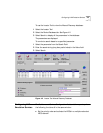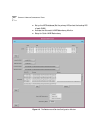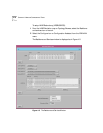
Configuring LAN Emulation Services 4-11
When LAN Emulation redundancy is activated on the NMS, see Activating
LANE Redundancy, and when a switch running the primary LES fails, the
NMS detects the failure. For the description of failure resolution, see “LES
Failure Resolution” on page 4-11. The backup LES in the LECS database is
then activated.
It is critical that the NMS be connected directly to the switch running the
LECS or have direct access to this switch.
The LANE clients that go back to the Initial State (As per the LANE 1.0
Specification, the LECs have to go back to the Initial state when the
connection to the LES fails.) then re-establish connection with the LECS
(LECS Connect Phase and Configuration Phase) to get the LES address.
After the LANE Monitor on the NMS triggers the activation of the backup
LES in the LECS database, the LECS serves the backup LES address for the
requested ELAN. This enables all the LANE clients (LECs) to rejoin the
ELAN. The ELAN is thus served by the backup LES/BUS pair).
LES Failure Resolution
To prevent the activation of the backup LES/BUS when the primary LES is
actually active, the LANE Monitor software performs the following checks
to verify the failure.
1 Verifies that if any one LEC is in the operational state, the backup LES is
not activated. The primary LES is assumed to be active one.
2 Verifies that the switch running the primary LES is up and active. If this is
not verifiable via direct SNMP contact, you can verify whether the switch
is OK via the neighboring switches address tables.
If either check indicates a LES failure, the backup LES is activated. The LES
failure resolution is reported as inconclusive. You can manually active the
redundant LES.
These important steps ensure the integrity of LANE services and provide a
robust and reliable recovery mechanism.
Pre-conditions for LANE Redundancy to Take Effect
Some LECs cannot bind to the backup LES even when they get the
correct information about the backup LES from the LECS. This may occur
because of problems related to route redundancy. It is important to
ensure that ATM re-routing operates even when some links or a switch is


















